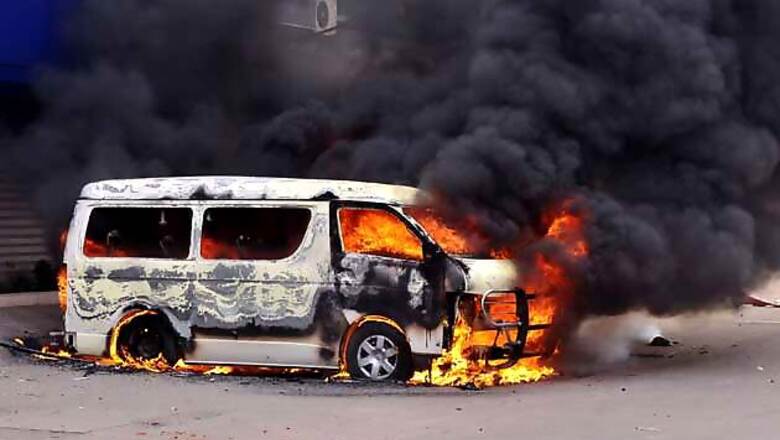
views
Dhaka: Bangladesh on Tuesday intensified security and ordered stern action against "troublemakers" after activists of the fundamentalist Jamaat-e-Islami indulged in violence and attacked police to demand halting of the 1971 war crimes trial of their leaders. Dozens of policemen, 21 of them in Dhaka, were injured as the extreme right wing activists launched attacks with homemade bombs in the capital, in southwestern Chittagong and several northwestern districts on Monday.
"The order has been issued asking police and other law enforcement agencies to maintain the law and order... take tougher stand against the troublemakers," a home ministry spokesman said. A senior official at the police headquarters, said that 600 named and unnamed JI activists have been charged in Dhaka alone and over 4,000 others elsewhere for creating law and order problems.
The fundamentalist party launched agitations in their strongholds as trials against their stalwarts were believed to have reached their fag ends in two special tribunals. Intensified police patrols were seen in the capital on Tuesday after Monday's violence but suspected JI activists torched two buses and damaged five others in old Dhaka streets and fled the scenes.
At least 200 vehicles were damaged and five were set on fire throughout Bangladesh Monday as protesters clashed for hours with police at Banshkhali area of Chittagong district -- a JI stronghold -- while their hit-and-run assaults also caught the law enforcers off guard in northwestern Rajshahi, Dinajpur, Joypurhat and southwestern Satkhira.
The JI activists had also tried to force their way inside the Bangladesh Secretariat when a cabinet meeting was underway there with Prime Minister Sheikh Hasina in the chair. The situation prompted elite President Guard Regiment (PGR) troops and the Special Security Force (SSF) people to take positions around the complex, which is the heart of the country's administration.
Officials familiar with the situation said that an annoyed Hasina asked her principal secretary to issue a verbal directive to police chief Hassan Mahmud Khandker to prevent recurrence of such a situation. Another senior premier's aide summoned Dhaka's police commissioner Benjir Ahmed to the PMO, virtually rebuking him for the police's visible failure in handling the violence.
An apparently embarrassed police commissioner reportedly asked policemen later to shoot at sight the JI activists, sparking fresh controversy. The main opposition Bangladesh Nationalist Party (BNP), a crucial JI ally, criticised him and called it an "illegal order".
"Yesterday's incident was tragic as the policemen were injured and BNP does not believe in the politics of violence and vandalism... but this does not mean that the police commissioner can order to shoot anybody," opposition chief whip in parliament Joynal Abdin Farroque told a party rally in the city. The ruling Awami League as well as several political analysts said JI was gradually appearing desperate as the ongoing trial of eight of their stalwarts was about to be completed.
A fugitive former member of the party was handed down death penalty two weeks back after a trial in absentia. Verdicts were pending against two other JI leaders and hearing is underway against several others, including party chief Matiur Rahman Nizami for committing "crimes against humanity" during the 1971 Liberation War.
JI stood against Bangladesh's independence and sided with the then Pakistani junta. Its politics was banned until 1975, when the post independence Awami League government was toppled in a military coup, and the subsequent regime allowed their return to politics.



















Comments
0 comment